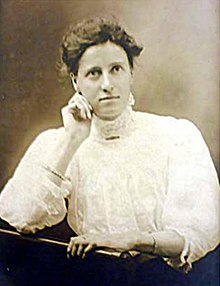Edith Alleyne Sinnotte (1871, Liverpool, UK – 15 November 1947, Balwyn, Victoria, Australia) was an Australian writer of British origin.[1] She is best known as the first female Esperanto novelist.[2]
Edith Alleyne Sinnotte | |
|---|---|
 Portrait of Sinnotte | |
| Born | 1871 Liverpool, UK |
| Died | 15 November 1947 (aged 75–76) Balwyn, Victoria, Australia |
| Occupation | Esperanto writer |
| Language | English |
| Genre | novel |
| Notable works | Lilio (1918) |
| Spouse | William Henry Mumford |
Life and work
editEdith Alleyne Sinnotte was born in 1871 in Liverpool in a family of Walter Powell Sinnotte and Isabella Baylis. She learned Esperanto in the United Kingdom before emigrating to Melbourne, Australia in 1894.[1] In December 1930 she married William Henry Mumford at the Holy Trinity Church, East Melbourne.[3]
She was a fellow of the British Esperanto Association and the president of the Mont Albert branch of the Esperanto society.[4] In 1918 her novel Lilio was published in London by British Esperanto Association.[5] It became the first novel in Esperanto by female author.[2]
Edith Alleyne Sinnotte died suddenly on 15 November 1947 at her home in Balwyn, Victoria, and was cremated.[6][7]
Books
edit- 1918 – Lilio[5]
References
edit- ^ a b "Edith Alleyne Sinnotte". esperanto.net. Retrieved 8 February 2020.
- ^ a b Sutton, Geoffrey (2008). Concise Encyclopedia of the Original Literature of Esperanto, 1887-2007. Mondial. p. 67. ISBN 978-1-59569-090-6.
- ^ "Family Notices". The Argus (Melbourne). Victoria, Australia. 24 January 1931. p. 11. Retrieved 9 February 2020 – via Trove.
- ^ "ESPERANTO NOTES". Camberwell and Hawthorn Advertiser. 12 July 1918. Retrieved 8 February 2020.
- ^ a b Alleyne Sinnotte, Edith (1918). Lilio: rakonto (in Esperanto). Londono: Brita Esperantista Asocio. OCLC 716914098.
- ^ "Family Notices". The Argus (Melbourne). Victoria, Australia. 17 November 1947. p. 9. Retrieved 9 February 2020 – via Trove.
- ^ "Family Notices". The Age. Victoria, Australia. 17 November 1947. p. 10 (FINAL EDITION). Retrieved 9 February 2020 – via Trove.